|
 Secure Site
Secure Site
|
 |
Archive for the 'Zen Alarm Clock' Category
 time your walking meditation with the Digital Zen Timer by Now & Zen, Inc. Ways to Relive Stress:
Get rid of nervous tension by inhaling as you take four steps, then exhaling for four steps. Repeat for at least three minutes (the longer, the better). Work up to six to eight steps per inhale and exhale. Use your Digital Zen Timer on the ‘Repeat Mode’ so that it will chime every three minutes to time yourself.
Now & Zen Headquarter Store
1638 Pearl Street
Boulder, CO 80302
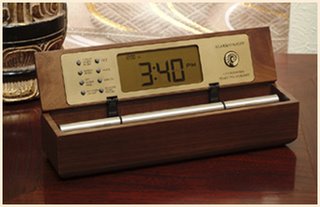 Timers and Alarms with Chimes
Posted in Chime Alarm Clocks, Meditation Timers, Meditation Tools, mindfulness practice, nature, Now & Zen Alarm Clocks, Yoga Timer, Zen Alarm Clock
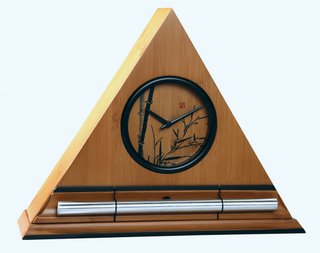 Bamboo Clocks Clocks As Learning Tools
It’s playtime―or is it cleanup time? Kids can master months of the year, days of the week, dates, and the concepts of a.m. and p.m. with a multipurpose clock and flip calendar on the wall.
 Kids meditation tools and timers Meditation Tools
The Digital Zen Clock also serves as a countdown and interval timer for yoga, meditation, bodywork, etc.; and it can also be set to chime on the hour as a tool for “mindfulness.”
Using a Singing Bowl Clock helps children time their meditation practice.
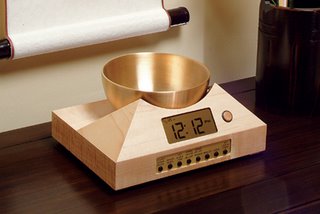 Clocks Can Be Used a Meditation Learning Tools for Children
Now & Zen
1638 Pearl Street
Boulder, CO 80302
(800) 779-6383
Posted in Bamboo Chime Clocks, wake up alarm clock, Zen Alarm Clock
Our Zen Timepiece’s acoustic 6-inch brass bowl-gong clock is the world’s ultimate alarm clock, practice timer, and “mindfulness bell.”
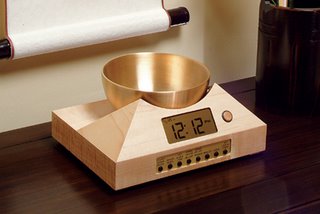 How to Decorate with Clocks
It fills your environment with beautifully complex tones whenever it strikes. In the morning, its exquisite sounds summon your consciousness into awakening with a series of subtle gongs that provide an elegant beginning to your day. Once you experience the Zen Timepiece’s progressive awakening, you’ll never want to wake up any other way. It also serves as the perfect meditation timer. Available in 5 wood styles.
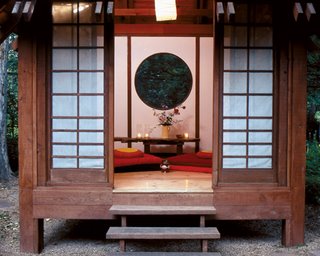 A Zen-like Clock helps Make Living Spaces More Zen Now & Zen Chime Clock Store
1638 Pearl Street
Boulder, CO 80302
(800) 779-6383
Posted in Bamboo Chime Clocks, Now & Zen Alarm Clocks, Well-being, Zen Alarm Clock
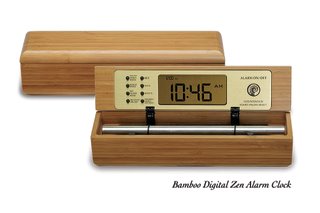 Wonderful, Soothing Chime Alarm Clocks Best Alarm Clocks:
Our Zen Alarm Clock Can Help You Wake-up on the Right Side of the Bed!
Weird and wonderful.
The Bamboo Digital Zen Clock’s long-resonating Tibetan bell-like chime makes waking up a beautiful experience – its progressive chimes begin your day with grace. When the clock’s alarm is triggered, the acoustic chime bar is struck just once … 3-1/2 minutes later it strikes again … chime strikes become more frequent over 10 minutes … eventually striking every 5 seconds until shut off. As they become more frequent, the gentle chimes will always wake you up – your body really doesn’t need to be awakened harshly, with a Zen Clock you’re awakened more gradually and thus more naturally.
 Sweetest Sounding Chime Alarm Clocks Now & Zen Headquarter Store
1638 Pearl Street
Boulder, CO 80302
(800) 779-6383
Posted in wake up alarm clock, Well-being, Zen Alarm Clock
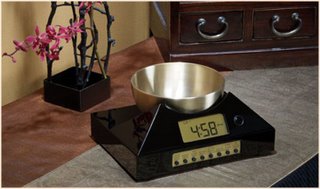 Zen Timepiece Black with Long-resonating Singing Bowl
Bells, gongs, and chimes are used prominently in both Eastern and Western spiritual traditions. The use of metal alloy bowls for devotional purposes can be traced back to the beginnings of metallurgy in China prior to 1,000 B.C. The bowl that comes with your Zen Timepiece is modeled after a Japanese “rin gong,” or Keisu, that is periodically struck with a stick to punctuate sutra-reading in Buddhist temples.
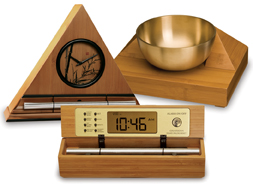 Singing Bowl Alarm Clocks and Chime Alarm Clocks Now & Zen Headquarter Store
1638 Pearl St.
Boulder, CO 80302
(800) 779-6383
Posted in Bamboo Chime Clocks, Zen Alarm Clock, Zen Timers
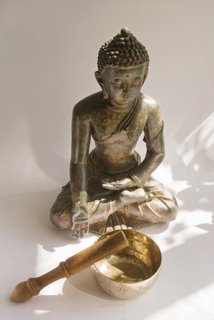 Carved Wooden Thai Buddha with Singing Bowl The Himalayan peoples have been using metal bowls in their rituals and as offerings to Deities since at least 560 B.C. These hand-hammered Himalayan alloy bowls have come to be known as “Tibetan Singing Bowls”
because of the unique way they are sounded by rubbing a mallet over the rim so as to produce harmonic resonances and overtones. Although the bowl that comes with your Zen Timepiece is not technically a Tibetan Singing Bowl, it will produce harmonic effects if a mallet or striking stick is rubbed around its edge in a circular motion.
The Himalayan peoples have been using metal bowls in their rituals and as offerings to Deities since at least 560 B.C. These hand-hammered Himalayan alloy bowls have come to be known as “Tibetan Singing Bowls” because of the unique way they are sounded by rubbing a mallet over the rim so as to produce harmonic resonances and overtones. Although the bowl that comes with your Zen Timepiece is not technically a Tibetan Singing Bowl, it will produce harmonic effects if a mallet or striking stick is rubbed around its edge in a circular motion.
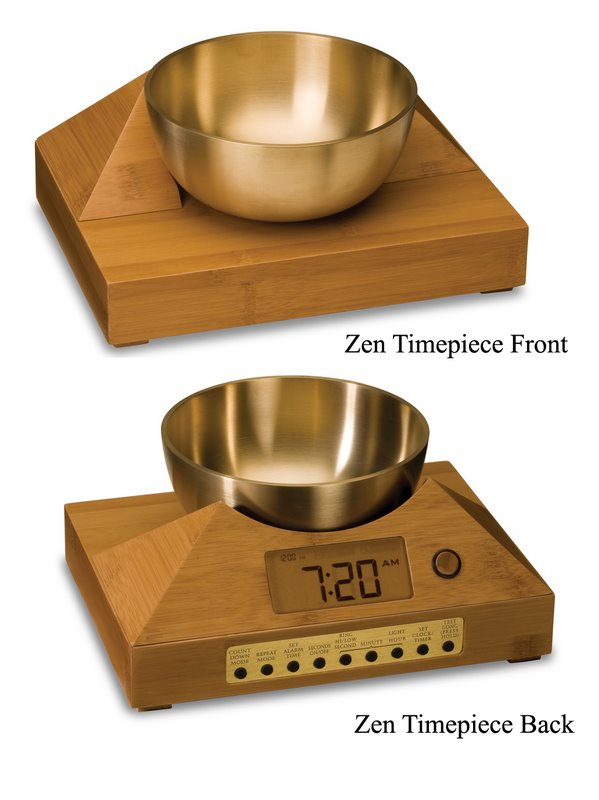 Singing Bowl Alarm Clocks for a Gentle Awakening Now & Zen
1638 Pearl St.
Boulder, CO 80302
(800) 779-6383
Posted in Bamboo Chime Clocks, Zen Alarm Clock, Zen Timers
 Meditation - Utamaro Woman I have always been intrigued by the idea of meditation. I would love to be able to sit quietly, relax and let my mind wander into a trancelike rest, all at the same time.
There are reported medical benefits to regular meditation too: you can bring down your heart rate and blood pressure. Meditation has been shown to help insomniacs sleep, nervous Nellies relax and those withchronic pain breathe more easily.
Meditation sounds like a perfect dream, actually, but who has time for that? As a television producer, I would say my daily list of things to do can run longer than a pilgrimage to the Ganges. Would it be worth adding meditation to my to-do list? I needed to be convinced.
So I went to Avery Fisher Hall in Manhattan for a group meditation led by Sri Sri Ravi Shankar, a spiritual leader and founder of The Art of Living Foundation. “The Guru,” as he is called, traveled from southern India to kick off the “I Meditate NY” campaign, designed to introduce stressed-out New Yorkers to the powers of the ancient practice of meditation. Gathered in the hall normally reserved for plays and operas were nearly 2,700 people ready to follow the spiritual teachings of the master on stage.
The preparation began with ancient Sanskrit chants from the folk group Bakti and soulful vocals from the Grammy-nominated singer Chandrika Tandon. But before long The Guru took center stage, sitting in the lotus position on a regal loveseat.
With a creeping smile on his face, he began to explain the three platinum rules of meditation. The first, he said, was to say to oneself, “For the next 10 minutes, I want nothing.” Sounded simple enough, but the truth is I did want something. I was a little hungry, even though I had a pretty big cheeseburger a few hours earlier. It even had all sorts of extras on it. My mind started to wander: Why was I hungry when I just had a big meal? Maybe it wasn’t as big as I thought? Oh man, that means that cheeseburger must have clearly been full of empty calories.
But The Guru had already moved on to platinum rule number two: “For the next 10 minutes, I do nothing.” Just then, my foot started to itch. I reached down to scratch it immediately, figuring the clock hadn’t yet started.
Rule three: “For the next ten minutes, I am nothing.” Now he was on to something. I liked that idea. It made me feel as if I had permission to float away, let my spirit drift into oblivion, all the while surrounded by thousands of people.
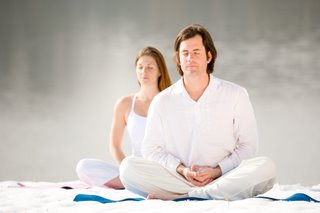 Meditation - Choose a Gong Meditation Timer Sounds of Silence
The group was full of Om’s and ready to sink into silence… or so we thought. Just then, The Guru reached into the pocket of his caftan for hiscellphone. The crowd burst into laughter — no doubt, this was a 21st-century guru. He promised it was only to time our imminent meditation, which he has said would last about 10 minutes.
Now we were on our way. He asked everyone to keep still and be quiet. If you didn’t think you could do so, it was now time for you to leave. He said nobody should leave in the middle of the journey, as that would not be fair to others around them. Parents with children were asked to leave now. It was time to begin.
The room fell silent, but not silent enough. There were coughs, bodily noises, feet sliding, and yes, a cell phone. I thought, it’s going to be tough to concentrate on doing nothing. The coughs seemed ceaseless. I wondered, well, we are heading into allergy season, is that why there are so many coughs? Or is this just how people always are? It isn’t often I’m in a room with 2,700 people.
But then something happened. I don’t really know what happened, because it’s as if I wasn’t there when it occurred. I mean, I was there, but I was nothing more than just there. Sitting. Breathing. Not hearing coughs. Not hearing feet shuffling. Not even hearing silence. I was awake. I was conscious. It wasn’t that hard. I was peaceful. I was meditating.
There we were. An auditorium full of silent people, together, effortless, releasing our minds from daily stress, buried in peace, meditating.
Meditation: Struggling to Do Nothing
And then it was over. The Guru woke us up — and then he gave us a jolt. He told us in his gentle meandering voice that we had been in this “amusement paradise” for 22 minutes. Not 10 minutes as he had suggested, but more than double that. The entire room gasped. We had disappeared for nearly the length of an evening news broadcast.
And, even though it felt counterintuitive to do something so seemingly solitary with so many others, it actually now made perfect sense. Later, The Guru told me, “Group meditations help in creating a positive energy in the atmosphere.” Meditation was all about vibrations, he said. Just as we “catch anger” from angry people around us, we “catch” positive energy from positive people around us. The room was surely full of positivity.
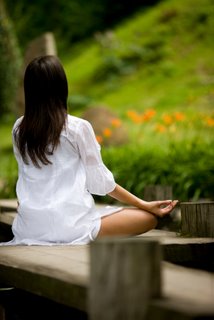 meditation timers with gongs So there you have it. A frazzled New Yorker with a Ganges-long list of to-dos may have just peacefully and willingly made her list longer.
Use our unique “Zen Clock” which functions as a Yoga & Meditation Timer. It features a long-resonating acoustic chime that brings your meditation or yoga session to a gradual close, preserving the environment of stillness while also acting as an effective time signal. Our Yoga Timer & Clock can be programmed to chime at the end of the meditation or yoga session or periodically throughout the session as a kind of sonic yantra. The beauty and functionality of the Zen Clock/Timer makes it a meditation tool that can actually help you “make time” for meditation in your life. Bring yourself back to balance.
It’s exquisite sounds summon your consciousness out of your meditative state with a series of subtle gongs. Once you experience the Zen Timepiece’s progressive tones, you’ll never want to meditate any other way. It serves as the perfect meditation timer. Available in 5 wood styles, including bamboo.
adapted from WorldNewsReport.com by Gitka Ahuja
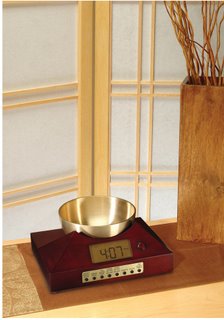 Gong Meditation Timers for Your Stillness Practice Now & Zen – The Gong Meditation Timer Store
1638 Pearl Street
Boulder, CO 80302
(800) 779-6383
Posted in Well-being, Yoga Timer, Yoga Timers by Now & Zen, Zen Alarm Clock, Zen Timepiece by Now & Zen, Zen Timers
 Being Kept Awake - What to Do? Ukiyoe Hokusai It’s annoying enough to be kept awake by a music-blaring neighbor, but when it’s you who is sabotaging your own opportunity for rest, it really makes a girl want to scream…and cry from exhaustion.
Stress-induced insomnia is rampant these days among 20- and 30-something women. Thanks to job and money craziness, hectic social schedules, and the pressure to be totally together, the typical chick is more tense than ever, and that means she’s getting less sleep than her body needs, explains Joyce Walsleben, PhD, associate professor of medicine at the New York University School of Medicine and coauthor of A Woman’s Guide to Sleep.
Here, we explain how stress messes with your nocturnal schedule. Plus, we give tips to help you quiet your reeling brain and racing heart so you can get the R & R you need.
How Chronic Stress Screws Up Your System
It should be simple: You are tired and it’s bedtime, so you drift away within minutes of putting head to pillow. But when you’re stressed, things go haywire, and the exact opposite happens instead. Being even a little anxious can make your muscles tense, prompt your body to release the stress hormones cortisol and adrenaline, and elevate your heart rate.
You can feel these effects when you’re worried during the day. But at night, they have a stronger impact, overriding your ability to sleep or preventing you from staying asleep so you wake in the middle of the night, says Thomas Roth, PhD, director of the sleep center at the Henry Ford Hospital, in Detroit. Even if you do manage to snooze, stress will make the rest you get more fitful. Plus, you’ll spend more time in the lighter stages of sleep rather than in deeper slow-wave and REM sleep, which leaves you vulnerable to waking in the middle of the night, explains Barry Krakow, MD, medical director of the Maimonides Sleep Arts and Sciences, in Albuquerque, New Mexico, and author of Sound Sleep, Sound Mind.
Why Women Have It Rougher
Hormonal shifts may make a woman more susceptible to anxiety during certain points in her cycle, such as during her preperiod week. But insomnia is also caused by the way so many chicks run their lives: cramming a ton of tasks and responsibilities into their schedules and not saying no to bosses, friends, and family members who ask them to take on more, says Walsleben.
When you’re juggling a zillion things all day, it’s almost impossible to chill out at night — especially since the time you’re waiting to fall asleep may be one of the only free moments during which you can contemplate your life. If you’re stressed, thoughts and worries will flood your mind, triggering physiological changes incompatible with drifting off.
 Wake up with gradual, beautiful acoustic chimes. The Zen Alarm Clock transforms your mornings and gets you started right, with a progressive awakening The Snowball Effect
If stress kept you up only once every so often, it wouldn’t be that big of a deal. Unfortunately, it’s the snowball effect that makes the stress-sleeplessness trap so pernicious. “It’s called psychophysiologic insomnia,” says Walsleben. “After worrying about how you got no sleep the night before, you get into bed early the next night, worried that it’ll happen again. But this panic produces brain activity that makes it even harder to sleep, and the cycle continues for days, even weeks.”
Besides leaving you tired and cranky, insomnia also decreases your immunity, makes you forgetful, and can even lower your metabolism so you pack on pounds. It’s a health issue that affects your entire body, Walsleben adds. Beating the Stress/No-Sleep Cycle
Getting a handle on this kind of insomnia means learning how to reduce your stress levels during the day and keeping yourself from wigging out at night. These anxiety reducers will help.
Unplug yourself. Always being hooked up to your cell and social- networking sites boosts anxiety because you’re constantly anticipating the next call, text, or message. “Turning off your gadgets for an hour or two before you hit the sheets gives your brain time to turn off as well,” explains Allen Elkin, PhD, director of the Stress Management and Counseling Center, in New York City, and author ofStress Management for Dummies.
Take a nap. It sounds counterproductive, but a 30-minute nap will lower levels of cortisol, so you’ll wake up feeling less anxious. Try to nap before 2 p.m., when it’s less likely to cut into your regular sleep hours.
Write a been-done list. Instead of a to-do list, jot down everything you’ve accomplished at the end of the day, even small tasks. Seeing the list in writing will remind you that your life is less frazzled and out of control than you think it is, and that’ll help you chill.
Set a daytime worry slot. Late in the afternoon, take 20 minutes to think about only whatever it is that’s making you nervous at the moment. “Worries are never as bad in the day as they are at night, so you’re more likely to put things in perspective and come up with a plan of action,” says Walsleben.
Sink into sleep. While you’re lying there, obsessing over whether sleep will ever come, ease your nervous system with this trick: Imagine the muscles in your feet relaxing and melting into your mattress. Picture the same scenario with your calves, then your thighs, until you have worked your way up your entire body. In addition to relaxing your muscles, it’s a visualization tactic that calms your brain as well.
Take advantage of being up at night. Instead of freaking out about how tired you are going to be in the morning, treat your being awake at 2 a.m. as a lucky break, giving you time to enjoy soothing activities like reading. By viewing insomnia as a positive thing, you’ll have nothing to stress about, and paradoxically, you will likely have trouble keeping your eyes open much longer.Sleep Tricks
Below, little tactics that bring on the zzz’s and some that backfire.
What Works
Taking a hot bath before bed. Besides being relaxing in its own right, the steamy water also raises your core body temperature, and the subsequent drop in body temperature after you leave the tub puts you in hibernation mode.
Sipping a cup of warm milk. The warmth is comforting, but it’s really the milk that has a soporific effect. Milk contains tryptophan, an amino acid that is converted into serotonin — a body chemical in the brain that makes you drowsy.
Playing quiet, soothing music. Folk, classical, and even lite-FM tunes that maintain a steady pitch and rhythm have a lulling effect on your system.
What’s Bunk
Exercising close to bedtime. Working out prompts the release of adrenaline and endorphins, hormones that keep you awake. Better to hit the gym at least three to four hours before you go to sleep so you give your body time to cool down and the hormone rush time to subside.
Having a drink. Alcohol can make you sleepy initially, but it will likely wake you up later as your body metabolizes the booze.
Snacking late at night. It varies depending on the type of food, but in most cases, eating will just pep you up. Even a rich, heavy snack that leaves you feeling woozy at first may cause you to wake in the middle of the night as your body digests the fat.
Wake up refreshed, love your alarm clock, transform your mornings with The Zen Alarm Clock’s progressive awakening with gentle chimes.
Boulder, Colorado—an innovative company has taken one of life’s most unpleasant experiences (being startled awake by your alarm clock early Monday morning), and transformed it into something to actually look forward to. “The Zen Alarm Clock,” uses soothing acoustic chimes that awaken users gently and gradually, making waking up a real pleasure.
Rather than an artificial recorded sound played through a speaker, the Zen Clock features an alloy chime bar similar to a wind chime. When the clock’s alarm is triggered, its chime produces a long-resonating, beautiful acoustic tone reminiscent of a temple gong. Then, as the ring tone gradually fades away, the clock remains silent until it automatically strikes again three minutes later. The frequency of the chime strikes gradually increase over ten-minutes, eventually striking every five seconds, so they are guaranteed to wake up even the heaviest sleeper. This gentle, ten-minute “progressive awakening” leaves users feeling less groggy, and even helps with dream recall.
Source: Registered nurse Joyce Walsleben, PhD
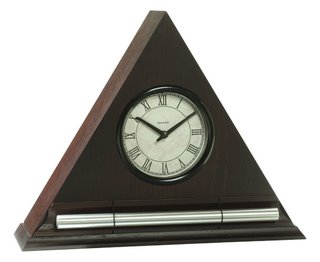 Progressive Chime Awakening - Choose the Most Natural Way to Wake Up Now & Zen – ‘The Most Natural Way to Wake Up’ Clock Shop
1638 Pearl Street
Boulder, CO 80302
(800) 779-6383
orders@now-zen.com
Posted in Bamboo Chime Clocks, sleep, Sleep Habits, zen, Zen Alarm Clock
 It's okay to nap during the day - Choose a gentle wake up - a Chime Zen Alarm Clock Have you ever felt an overpowering urge to find privacy and a bed for a midday “quickie?” Don’t feel guilty about that. It’s just your body telling you what it needs — sleep!
It’s unfortunate that most daily schedules can’t accommodate that need. Quickie naps are good for you. During the nap period of seeming inactivity, you do not simply “turn off;” complex reparative processes occur in your body. While the exact physiologic mechanisms responsible for the benefits of napping are not yet well understood, its positive outcomes have been confirmed in studies: they include improvements in mood, alertness, memory, performance and decision-making ability.
Let’s start with the best time for a nap: afternoon. An afternoon nap does not disrupt normal circadian (meaning: about a day) rhythms, whereas a morning or evening nap can — making it harder for you to return to your usual sleep routine that night. Your body probably already tells you this: circadian changes in your hormones and temperature are likely to make afternoon a naturally sleepy time for you. These cyclical patterns help explain why simply tacking more minutes or hours of sleep onto your nocturnal sleep time won’t necessarily prevent afternoon sleepiness. No matter how much you sleep at night, the afternoon urge will probably hit you.
How long should you nap? About 20 minutes. Anything much longer can backfire. You know that prolonged groggy feeling you sometimes feel after a nap? It’s called sleep inertia; you may have experienced it if you napped too long. Sleep inertia can take anywhere from 15 minutes to 4 hours to wear off. During this period, studies have shown impairments in mood, alertness, memory, performance and decision-making abilities. The likelihood of developing sleep inertia depends on several factors, one of which is the sleep stage from which you awaken. In a June, 2006 study in Sleep (the peer-reviewed publication of the Associated Professional Sleep Societies), investigators demonstrated the positive cognitive effects following 10- and 20-minute naps, but also the negative effects of sleep inertia following a 30-minute nap. The 30-minute timing coincides with the normal onset of deep sleep (also called slow-wave sleep). Limiting your nap time will help prevent entry into deep-sleep stages — avoiding sleep inertia while minimizing disruptions to your normal nocturnal sleep.
 Choose the most natural wake up -- a gentle Zen Alarm Clock with Soothing Chimes Keep in mind quickie-napping can’t compensate for significant sleep debt. While the increasing demands of our lifestyles may not reflect it, a wealth of research has verified that most adults require an average of 7 to 9 hours of sleep each night. Be mindful of persistent sleepiness throughout the day, despite adequate nocturnal sleep: it may be a symptom of a sleep disorder (such as narcolepsy, periodic limb movements, or obstructive sleep apnea) or an underlying medical problem (such as thyroid disease, serious infection or illness, anxiety or depression). Always listen to your body and speak with your doctor about your concerns.
And … try to sneak in a midday nap. But, remember, keep it quick!
Dr. Nayer Khazeni specializes in internal medicine and pulmonary/critical care, teaches, and conducts research at Stanford University Medical Center.
Waking up in the morning should be as pleasant as falling asleep at night. The Zen Alarm Clock’s gradual, gentle awakening is transformative.
Our Zen Timepiece’s acoustic 6-inch brass bowl-gong clock is the world’s ultimate alarm clock, practice timer, and “mindfulness bell.”
It fills your environment with beautifully complex tones whenever it strikes. In the morning, its exquisite sounds summon your consciousness into awakening with a series of subtle gongs that provide an elegant beginning to your day. Once you experience the Zen Timepiece’s progressive awakening, you’ll never want to wake up any other way. It also serves as the perfect meditation timer. Available in 5 wood styles, including bamboo.
adapted from sfgate.com by Nayer Khazeni, M.D.
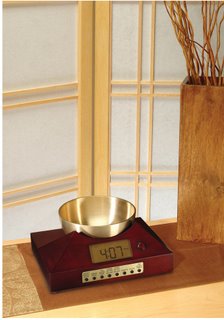 The Zen Timepiece - An acoustic 6-inch brass bowl-gong clock Now & Zen – The Bowl Gong Clock Store
1638 Pearl Street
Boulder, CO 80302
(800) 779-6383
orders@now-zen.com
Posted in sleep, Sleep Habits, wake up alarm clock, Zen Alarm Clock, Zen Timepiece by Now & Zen, Zen Timers
 How to choose a great alarm clock with natural sounds - Visit Now & Zen, Inc. - Boulder, CO The next time you think about studying all night with your face in a book, think about this: Your brain will work better if you sleep on that book instead.
Shut-eye may be a good performance-boosting strategy, according to a new study presented at the Society for Neuroscience Conference in Atlanta.
Scientists from Harvard University studied nearly 100 college students to find out whether sleep can improve memory.
They divided the students into two groups and told each student to memorize several lists of related words — such as bed, sheet, and pillow or sill, glass, and pane — as they were read aloud.
The first group tried to memorize the lists at 9 a.m. while the second group tried to memorize the lists at 9 p.m.
The memory test came 12 hours after the students had first heard the words.
So, daytime learners were tested at 9 p.m. while night learners were tested at 9 a.m.
But the students who first learned the words during the evening got a good night’s rest before facing their memory test the next morning.
Each group was asked to write down all the words that they could remember. Researchers found that the students who studied the lists at 9 p.m. and got some sleep remembered more words than the students who were tested after staying awake throughout the day.
The Phenomenon of Remembering Incorrectly
However, the students who got some sleep also recalled some words that were not on the lists.
From a list of words including bed, sheet and pillow, a student may incorrectly remember the word “sleep” or form a false memory for the word “window” in a list including sill, glass and pane.
The students were remembering words that were associated with the ones that they had actually heard.
Scientists call this phenomenon of incorrectly remembering something that didn’t happen a “false memory.”
False memories are not all that unusual. It’s similar to a feeling you have when you think you’re sure that something happened — until someone proves you wrong.
Then you realize that your false memory was just an idea very closely related to something that happened in reality.
Sleep Plays a Role in False Memories
The students who snoozed before testing had more of these false memories than their friends who did not sleep.
This is the first time scientists have seen that sleep plays a role in false memories — and researchers are excited about the discovery.
The finding suggests that the brain is hardly asleep when the rest of the body is.
“Sleep is not a passive state where we lay around and lose productivity, but an active process during which the brain is integrating information,” said Dr. Christoph Nissen, sleep researcher and postdoctoral fellow at the Western Psychiatric Institute in Pittsburgh.
According to this study, the brain is engaged in a sort of wordplay while the body is asleep.
 sleep improve ones memory This finding suggests that a learning process occurs during sleep that has a lot to do with language and what words mean, says Dr. Lawrence Epstein, past president of the American Academy of Sleep Medicine, and medical director of Sleep Health Centers in Boston.
Our brain forms links between our memories for these words to help us store information in a way that is meaningful to us.
During sleep, “our brain is writing a summary,” said Dr. Robert Stickgold, study author and associate professor of psychiatry at Harvard Medical School and Beth Israel Deaconess Medical Center.
When the brain awakes, it may recall words from this summary even though those words weren’t part of the original exercise.
Forget the All-Nighters
Sleep may do interesting things to our memories, but not sleeping can wreak havoc on the brain and on the body.
Experts say that getting enough sleep is vital to our overall health.
It plays a role in immune function, emotional regulation, and other processes like the ability to concentrate.
There’s no substitute for serious studying, but a good night’s sleep may prove to be more helpful than scientists previously thought.
“People who study and then sleep recall things better than people who stay up all night studying,” Epstein said.
Boulder, Colorado—an innovative company has taken one of life’s most unpleasant experiences (being startled awake by your alarm clock early Monday morning), and transformed it into something to actually look forward to. “The Zen Alarm Clock,” uses soothing acoustic chimes that awaken users gently and gradually, making waking up a real pleasure.
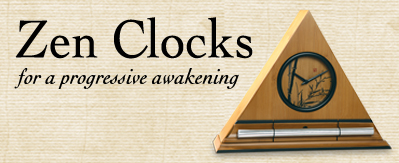 Get help choosing a different alarm clock -- Visit our store - Now & Zen, Inc. - Boulder, CO Rather than an artificial recorded sound played through a speaker, the Zen Clock features an alloy chime bar similar to a wind chime. When the clock’s alarm is triggered, its chime produces a long-resonating, beautiful acoustic tone reminiscent of a temple gong. Then, as the ring tone gradually fades away, the clock remains silent until it automatically strikes again three minutes later. The frequency of the chime strikes gradually increase over ten-minutes, eventually striking every five seconds, so they are guaranteed to wake up even the heaviest sleeper. This gentle, ten-minute “progressive awakening” leaves users feeling less groggy, and even helps with dream recall.
adapted from abcnews.go.com by LISA PHILIPOSE
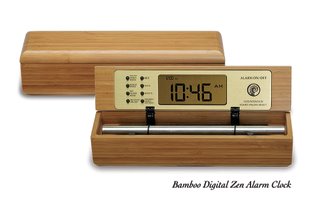 Choose the right alarm clocks for a refreshed mood in the morning - Visit Now & Zen, Inc - Boulder, CO Now & Zen – The Alternative Alarm Clock Shop
1638 Pearl Street
Boulder, CO 80302
(800) 779-6383
Posted in Bamboo Chime Clocks, Natural Awakening, Now & Zen Alarm Clocks, sleep, Sleep Habits, Zen Alarm Clock
« Previous Page — « Previous Entries
Next Entries » — Next Page »
|
|
|
|